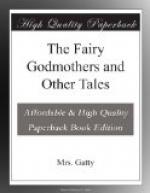This scene brings before you a story of distress, and yet this young man is the possessor of a large estate;—the baronial hall and house are his own, and he is young and amiable, and till within the last few months had led a life of almost uninterrupted comfort and prosperity from his cradle upwards. Two years ago he became the betrothed lover of a young lady no less interesting than himself, and as no obstacle prevented their union, both had for these two years looked forward to it, as the one certain and sure event of their lives. The young man’s parents had died when he was very young; but, in compliance with the wishes of his Guardians, he deferred his marriage till he should have come of age.
Meanwhile, as the time of probation drew near its close, it had been his delight to sit up the old place in such a manner as should become his bride, and the alterations had, in many cases, been made under her eye and according to her wishes, for she was already by anticipation, and in the heart of its owner, the mistress of the place.
At last the wedding day was fixed; but a few weeks before the time came, one of those sad diseases which steal mysteriously into the vitals of the young and wear away life long before its natural period, fell upon her:—and now, nothing remained to him, who had hoped to have her as his companion through life, but the Bible she had used during her sickness, and which was found on the table by her couch after her death, open and marked at the very place I have told you about; together with the faded primrose which he had gathered for her on the last morning of her life.
This was a very sad event for those who were left behind to lament the loss of one whom they had loved so dearly. The Mother indeed, who had known other trials of life, bent her head submissively to this one, and cherishing sweet recollections of her daughter’s piety and goodness, looked forward to a time of reunion in a happier world. But the poor young man, whose name was Theodore, never having known a care or a sorrow before, was stupefied and overpowered by this sudden destruction of all his hopes and happiness. Seeing, however, that her last thought had been the mercy and goodness of God, he tried to make it his thought too; and he would sit for hours looking at the verse which she had marked in the Bible.
But unfortunately he made no effort besides, and having no kind relatives or friends near him to rouse him from his melancholy stupor to some of the active duties of life, he spent many many weeks in listless sorrow, not caring much what became either of himself, his dependents, or his property. And though he had become, by degrees, so far resigned as to believe that every thing was for the best—even her death—he now took up a strange and dismal fancy, that though the Almighty was a God of goodness and justice, it was quite impossible that He should love any beings so sinful and ungrateful as the human race. This vain distinction of a morbid imagination was the result of that solitude, inactivity, and the constantly dwelling upon himself and his own troubles, to which he had unfortunately given himself up, and which had brought his mind into such an unhealthy state, that he could neither reason nor think properly.




